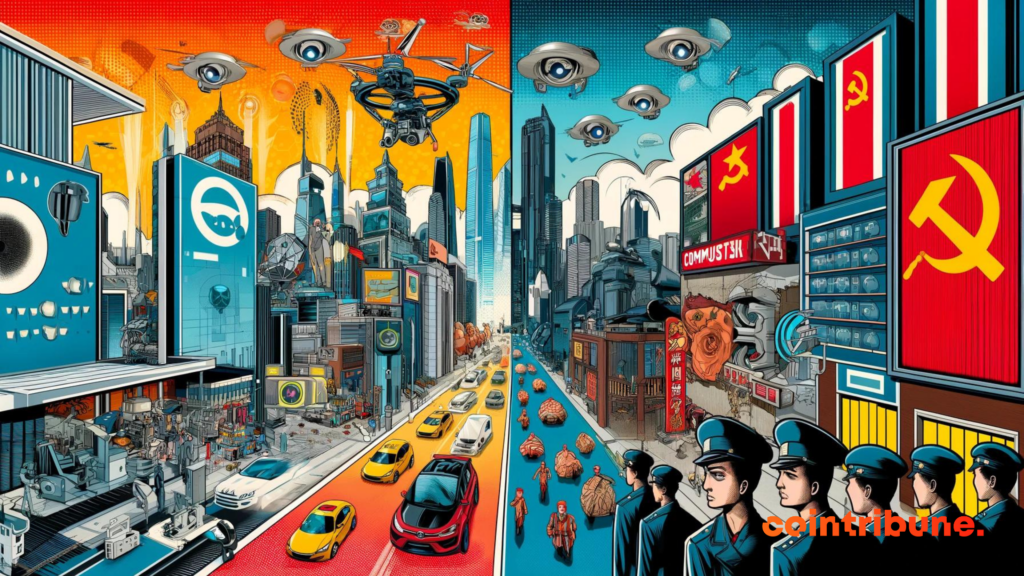Communism Is Back
Liberal democracy seemed invincible, having triumphed over the forces of fascism and communism. Two decades later, this supremacy is seriously questioned. The dynamics of information in the technological era and geopolitical alliances threaten liberal democracy in the 21st century. Are we heading towards communism in the coming years?

From the Triumph of Liberal Democracy
Liberal democracy won the 20th century, fascism and communism both collapsed, and by the end of the century, the United States and their democratic allies in Asia and Europe were in the midst of economic and military ascendance.
Even China, which remained an autocracy, liberalized its economy and parts of its society during this period. Even academics who refused to admit Francis Fukuyama’s “end of history” generally supported the arguments that capitalism and/or liberal democracy promoted peace, happiness, and prosperity.
Two decades later, this idea is deeply questioned. The wave of democratization and social liberalization has reversed.
Meanwhile, China, the rising superpower of the early 21st century, has reverted to a more dirigiste economy and a more totalitarian society under the leadership of Xi Jinping.
The Chinese Rival
There is no doubt that Chinese cities are much cleaner and safer than San Francisco or New York. Meanwhile, China can manufacture electric vehicles, batteries, and computer chips in abundance, whereas it has yet to be proven that America can do the same.
China can provide abundant housing for its population (sometimes too much), while America faces a chronic housing shortage. China’s strength is not limited to manufacturing: TikTok is so well designed and addictive that it has outperformed American short video services on their home turf. And despite the difficulties of the United States, the situation of their liberal democratic allies is even worse.
Meanwhile, China is assembling a powerful network of allies – Russia, Iran, and North Korea – ending the idea that autocracies cannot cooperate, and forming a coalition that could already surpass the West militarily.
Towards an Export of Chinese Communism
Is the Chinese model going to prevail? Can universal surveillance, speech control, suppression of religion and minorities, as well as command and control of the economy really be the keys to national power and stability in the 21st century?
How could this be true, when these same things failed so completely in the 20th century with the collapse of fascism and communism?
Why the Market Economy Prevailed Over Communism
Hayek had a theory that explained why capitalist economies performed better than planned economies. His theory was about the aggregation of information. Fundamentally, the function of an economy, as he sees it, is to give people as much as possible of what they want, given limited resources. And the people themselves have much more information about what they want and how to efficiently use productive resources than a central planner. The function of a market, according to Hayek, is to aggregate these small bits of useful dispersed knowledge in order to better inform production decisions.
According to Hayek, markets achieve this through prices. Prices are information. If broccoli is expensive and cauliflower is cheap, it indicates to farmers that they should produce more broccoli and less cauliflower. And so on. In a planned economy, poorly informed central planners might wrongly decide that cauliflowers are perfectly fine and that we should produce more of them.
Tesla or BYD?
Let’s compare the Chinese EV flagship, BYD, with the American flagship, Tesla. Both are roughly equivalent in terms of revenue and are generally considered to be two of the best manufacturing companies in the world. But the financial input required for their construction was very different. Tesla’s growth required the extraordinary efforts of Elon Musk, the country’s most flamboyant business star, in terms of sales.
Although the company’s Model 3 eventually became a huge success, the capital cost of producing the vehicle nearly bankrupted the company.
Musk had to engage in constant public fundraising, spending a lot of time on Twitter. He had to be very creative in financial engineering, going as far as cannibalizing some of his other ventures. And it is not even certain that this effort would have succeeded without offshoring much of Tesla’s production to China.
BYD, on the other hand, never had to scramble and desperately seek funding. Although it went through a number of very difficult periods, it continued to benefit from generous and often subsidized financing from banks controlled by the Chinese state.
Today, it has matched Tesla in terms of sales and arguably in terms of technology.
The End of Liberal Democracy
We can outline a general theory about how liberal democracy might be much less suited to the 21st century than it was to the 20th century. With advances in information technology, the costs of collecting information may have fallen to such a low level that the advantages of liberal institutions – markets, elections, and freedom of expression – may be diminished. Thus, it might be that while China builds cars, Americans argue about transgender athletes.
While China builds electronic chips, Americans spend their time debunking fake economic statistics.
While China builds submarines, Americans spend their time high-frequency trading.
While China builds trains, Americans raise funds for elections.
And so on. Meanwhile, thanks to the internet invented by America, Chinese leaders can get a sense, always inferior but much less worse than their Maoist and Stalinist predecessors, of which products to manufacture, which policies to implement, and which ideas to adopt.
Goodbye Freedom, Hello Communism
If liberal democracy is simply not the most efficient way to organize a society in the era of cheap information, it simply means that the individual freedoms we have come to know and love are disappearing.
Sometimes, one system simply replaces another after a major technological change – agriculture mostly led to the end of hunter-gatherer groups, industrialization led to the end of monarchies, and so on.
If the information era has surpassed liberalism, we will experience a very dark period, and there is not much we can do to remedy it.
We should continue to fight for liberal democracy, and hope that technology and human nature allow for its continued victory. Or invent a new system, new non-democratic but liberal institutions.
Maximize your Cointribune experience with our "Read to Earn" program! For every article you read, earn points and access exclusive rewards. Sign up now and start earning benefits.

Chaque jour, j’essaie d’enrichir mes connaissances sur cette révolution qui permettra à l’humanité d’avancer dans sa conquête de liberté.
The views, thoughts, and opinions expressed in this article belong solely to the author, and should not be taken as investment advice. Do your own research before taking any investment decisions.